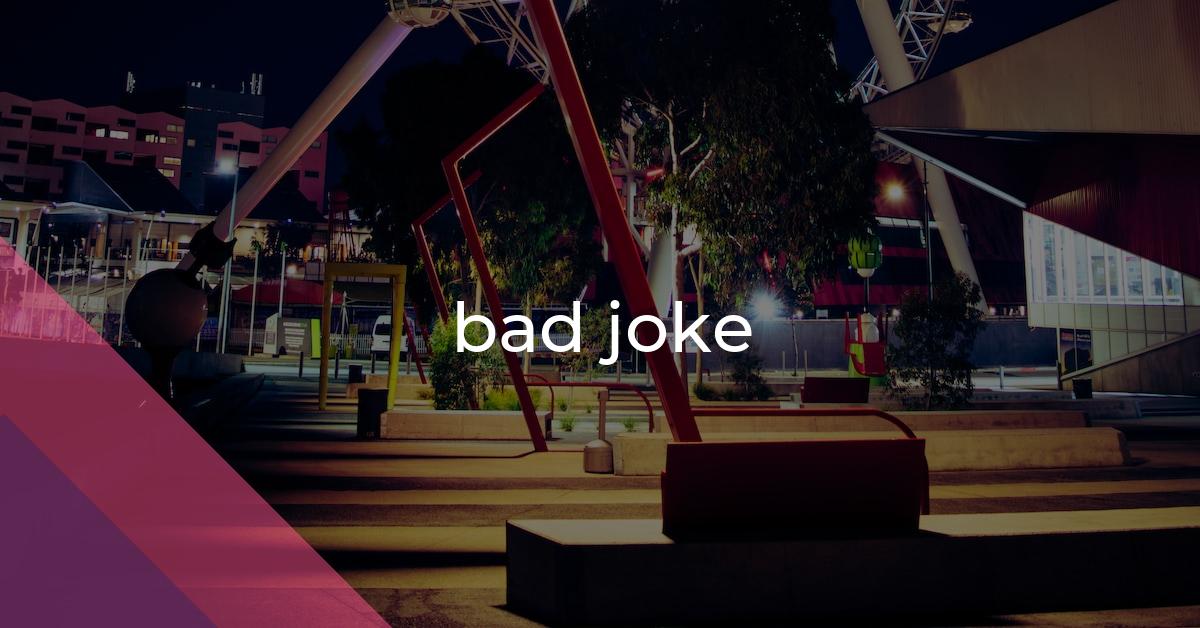bad joke: Idiom Meaning and Origin
What does ‘bad joke’ mean?
The idiomatic phrase "bad joke" refers to a joke that is not funny, often due to being in poor taste or lacking cleverness. It implies that the joke is of low quality and likely to elicit negative reactions from the audience.

Idiom Explorer
The idiom "laughing stock" refers to a person or thing that is ridiculed and made fun of by others, causing amusement and laughter. It carries a negative connotation and is often associated with someone who is seen as absurd, ridiculous, or deserving of mockery.
The idiom "knee slapper" refers to a joke or humorous situation that is extremely funny, causing someone to slap their knee in laughter.
The idiom "jive turkey" is a derogatory term used to describe someone who is not trustworthy or who speaks insincerely.
The idiom "jerkoff" is a vulgar slang term used to describe someone who is considered foolish, stupid, or annoying. It is an insult that implies a lack of intelligence or worthlessness.
An "inside joke" is a humorous reference or remark that is understood only by a specific group of people who know the context behind it.
The idiomatic phrase "in jest" means to say or do something as a joke or in a lighthearted manner, not intended to be taken seriously.
The idiom "I'm not being funny" is used to preface a statement that may sound critical or harsh, but the speaker wants to assure the listener that they are not trying to be offensive or rude.
The idiom "have a laugh" means to find something amusing or entertaining and to enjoy a good laugh or joke.
The idiom "half joke" refers to a statement or remark that is meant to be humorous, but also contains a serious or true element. It is a way of expressing a thought or opinion in a lighthearted manner while acknowledging some underlying truth or seriousness.
Decoding the Humor
The idiom "bad joke" is a commonly used phrase in the English language, typically referring to a joke that is not funny. It is often characterized by being unfunny, tasteless, or inappropriate. The term is a compound noun phrase that combines the adjective "bad" with the noun "joke." The word "bad" in this context conveys the idea that the joke falls short of expectations or fails to meet the criteria of humor, thereby being considered as substandard or inadequate.
The idiomatic phrase "bad joke" is used in various contexts and situations, both informally in everyday conversations and in more formal settings. It can be employed to describe a range of humor-related failures, such as a joke that lacks cleverness, wit, or an appropriate punchline. The idiom reflects the subjective nature of humor, highlighting the fact that what may be amusing to one person might not be so to another.
It is worth noting that humor and what constitutes a "good" or "bad" joke can vary greatly depending on cultural, societal, and personal factors. What may be perceived as a "bad joke" in one context or cultural setting may be seen as funny or acceptable in another. Therefore, the idiom "bad joke" is inherently subjective and dependent on individual perspectives and cultural norms.
Historically, the use of idioms to express negative opinions about humor is not unique to the idiom "bad joke." For instance, idioms such as "lame joke," "corny joke," or "dud joke" are also employed to convey a similar meaning of a joke that is unsuccessful in eliciting laughter or amusement. However, the idiom "bad joke" remains one of the most commonly used and recognized phrases in this context.
The idiom "bad word" is another related phrase that is often used in conjunction with "bad joke." It refers to a word or phrase that is considered offensive, inappropriate, or vulgar. While "bad joke" is focused on the humor aspect, "bad word" highlights the inappropriateness or offensiveness of certain words or language.
in jest, an idiomatic expression meaning "in a joking manner," is also closely related to the idiom "bad joke." When something is said "in jest," it means it was meant to be taken as a joke and not to be taken seriously. So, when a joke is described as a "bad joke," it implies that the joke was not successful in its intended humorous or light-hearted nature and may have been taken seriously or interpreted negatively.
funny stuff, another idiom related to "bad joke," is used to describe something humorous or amusing. While "bad joke" refers specifically to jokes that are deemed as failures, "funny stuff" encompasses a broader range of humorous content, including jokes, stories, and other forms of entertainment that elicit laughter or amusement.
The idiom "bad joke" is a widely recognized expression in the English language, used to describe a joke that is considered to be of poor quality or unfunny. Its usage can be found in various contexts and situations, reflecting the subjective nature of humor. While the phrase has been in use for many years, its relevance and applicability continue to evolve as new forms of humor emerge. The idiom captures the nuances and complexities of humor, reminding us that what may be considered "good" or "bad" is often subjective and varies depending on individual perspectives and cultural norms.
Example usage
1. He told a bad joke at the party and no one laughed.
2. I tried to lighten the mood with a bad joke, but it only made everyone more uncomfortable.
3. The comedian's performance was disappointing as he struggled to come up with a good punchline, resulting in a string of bad jokes.
More "Humor" idioms



